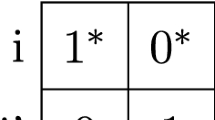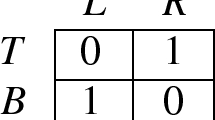Abstract
A stochastic game is a two-player game played on a graph, where in each state the successor is chosen either by one of the players, or according to a probability distribution. We survey stochastic games with limsup and liminf objectives. A real-valued reward is assigned to each state, and the value of an infinite path is the limsup (resp. liminf) of all rewards along the path. The value of a stochastic game is the maximal expected value of an infinite path that can be achieved by resolving the decisions of the first player. We present the complexity of computing values of stochastic games and their subclasses, and the complexity of optimal strategies in such games.
This research was supported in part by the Swiss National Science Foundation under the Indo-Swiss Joint Research Programme, by the European Network of Excellence on Embedded Systems Design (ArtistDesign), by the European projects COMBEST, Quasimodo, Gasics, by the PAI program Moves funded by the Belgian Federal Government, and by the CFV (Federated Center in Verification) funded by the F.R.S.-FNRS.
Preview
Unable to display preview. Download preview PDF.
Similar content being viewed by others
References
Bjorklund, H., Sandberg, S., Vorobyov, S.: A combinatorial strongly subexponential strategy improvement algorithm for mean payoff games. In: Fiala, J., Koubek, V., Kratochvíl, J. (eds.) MFCS 2004. LNCS, vol. 3153, pp. 673–685. Springer, Heidelberg (2004)
Chakrabarti, A., de Alfaro, L., Henzinger, T.A., Stoelinga, M.: Resource interfaces. In: Alur, R., Lee, I. (eds.) EMSOFT 2003. LNCS, vol. 2855, pp. 117–133. Springer, Heidelberg (2003)
Chatterjee, K., Doyen, L., Henzinger, T.A.: Quantitative languages. In: Kaminski, M., Martini, S. (eds.) CSL 2008. LNCS, vol. 5213, pp. 385–400. Springer, Heidelberg (2008)
Chatterjee, K., Henzinger, T.A.: Value iteration. In: Grumberg, O., Veith, H. (eds.) 25 Years of Model Checking. LNCS, vol. 5000, pp. 107–138. Springer, Heidelberg (2008)
Chatterjee, K., Henzinger, T.A.: Probabilistic systems with limsup and liminf objectives. In: ILC (2009)
Chatterjee, K., Henzinger, T.A., Piterman, N.: Algorithms for Büchi games. In: GDV (2006)
Chatterjee, K., Jurdziński, M., Henzinger, T.A.: Simple stochastic parity games. In: Baaz, M., Makowsky, J.A. (eds.) CSL 2003. LNCS, vol. 2803, pp. 100–113. Springer, Heidelberg (2003)
Chatterjee, K., Jurdziński, M., Henzinger, T.A.: Quantitative stochastic parity games. In: SODA 2004, pp. 121–130. SIAM, Philadelphia (2004)
Condon, A.: On algorithms for simple stochastic games. In: Advances in Computational Complexity Theory. DIMACS Series in Discrete Mathematics and Theoretical Computer Science, vol. 13, pp. 51–73. American Mathematical Society (1993)
de Alfaro, L.: Formal Verification of Probabilistic Systems. PhD thesis, Stanford University (1997)
Filar, J., Vrieze, K.: Competitive Markov Decision Processes. Springer, Heidelberg (1997)
Gimbert, H.: Jeux positionnels. PhD thesis, Université Paris 7 (2006)
Gimbert, H., Zielonka, W.: Games where you can play optimally without any memory. In: Abadi, M., de Alfaro, L. (eds.) CONCUR 2005. LNCS, vol. 3653, pp. 428–442. Springer, Heidelberg (2005)
Karp, R.M.: A characterization of the minimum cycle mean in a digraph. Discrete Mathematics 23, 309–311 (1978)
Liggett, T.A., Lippman, S.A.: Stochastic games with perfect information and time average payoff. Siam Review 11, 604–607 (1969)
Maitra, A., Sudderth, W. (eds.): Discrete Gambling and Stochastic Games. Springer, Heidelberg (1996)
Martin, D.A.: The determinacy of Blackwell games. The Journal of Symbolic Logic 63(4), 1565–1581 (1998)
McNaughton, R.: Infinite games played on finite graphs. Annals of Pure and Applied Logic 65, 149–184 (1993)
Thomas, W.: Languages, automata, and logic. In: Rozenberg, G., Salomaa, A. (eds.) Handbook of Formal Languages. Beyond Words, ch. 7, vol. 3, pp. 389–455. Springer, Heidelberg (1997)
Zwick, U., Paterson, M.: The complexity of mean payoff games on graphs. Theoretical Computer Science 158, 343–359 (1996)
Author information
Authors and Affiliations
Editor information
Editors and Affiliations
Rights and permissions
Copyright information
© 2009 Springer-Verlag Berlin Heidelberg
About this paper
Cite this paper
Chatterjee, K., Doyen, L., Henzinger, T.A. (2009). A Survey of Stochastic Games with Limsup and Liminf Objectives. In: Albers, S., Marchetti-Spaccamela, A., Matias, Y., Nikoletseas, S., Thomas, W. (eds) Automata, Languages and Programming. ICALP 2009. Lecture Notes in Computer Science, vol 5556. Springer, Berlin, Heidelberg. https://doi.org/10.1007/978-3-642-02930-1_1
Download citation
DOI: https://doi.org/10.1007/978-3-642-02930-1_1
Publisher Name: Springer, Berlin, Heidelberg
Print ISBN: 978-3-642-02929-5
Online ISBN: 978-3-642-02930-1
eBook Packages: Computer ScienceComputer Science (R0)




